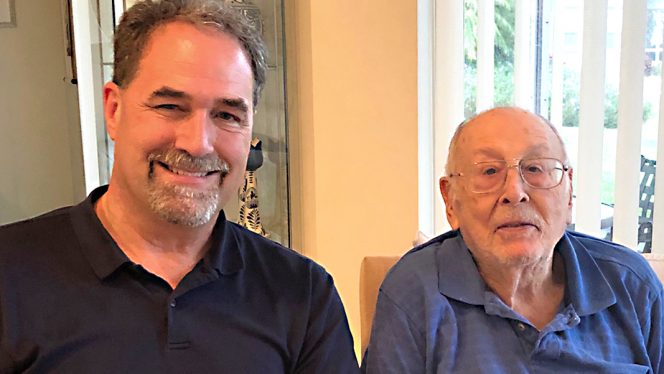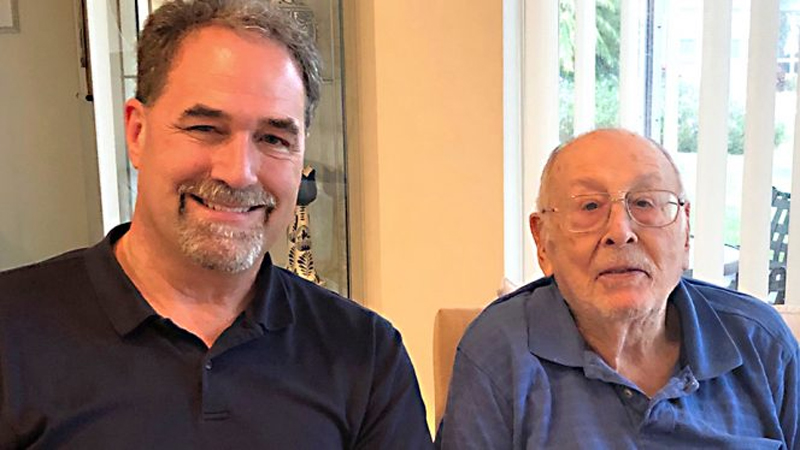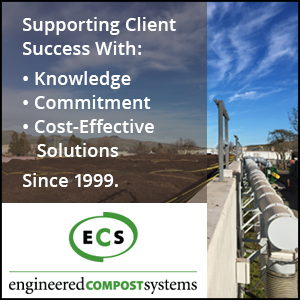Todd Williams
Dr. Eliot Epstein passed away on Sunday May 17, 2020 at the age of 91. Eliot was a devoted husband to his beloved wife Esther for 69 years, a wonderful father to his three children, Beth, Jonathan and Lisa, and grandfather to three grandchildren and one great grandchild. This is who he was to his family. But to us in the composting world, Eliot was so much more. To me, Eliot was a lifelong mentor in the Science of Composting.

Todd Williams (left) and Eliot Epstein (right)
I first met Dr. Epstein at a BioCycle conference in Philadelphia, Pennsylvania in November 1980. I was fresh out of college, managing a 20 MGD wastewater treatment plant in Newport News, Virginia and preparing to start a composting facility to manage our sludge (there were no such thing as biosolids in those days!) and I needed to learn how to do it. Eliot was larger than life at the Conference — very outspoken, always the visionary, always thinking how he could help others do composting better. He must have spoken 2 to 3 times at that conference on various aspects of composting, including process performance, the science of pathogen inactivation, and use of the resultant compost product.
There were less than two dozen sludge composting facilities in the U.S. at that time, and Eliot was one of the first pioneers in that space having studied the process for several years at the U.S. Department of Agriculture’s research lab in Beltsville, Maryland. From his research work along with colleagues George Willson, Wiley Burge and many others, Eliot was the primary author of the landmark paper, “A Forced Aeration System for Composting Wastewater Sludge,” published in the Journal of Water Pollution Control Federation (now WEF) in April 1976. This paper and subsequent co-authored publications of Eliot’s catapulted the technology of composting sludge from a couple dozen installations to over 250 today in the U.S.
Eliot and I crossed paths again in 1986 as part of an EPA post construction contract he was performing at Hampton Roads Sanitation District’s Peninsula Composting Facility that I managed. Later that year, he offered me a job at E&A Environmental Consultants where he was the President and Chief Scientist. My acceptance of this offer was a personal risk as I was leaving a great stable job. But, this decision launched my career into the sludge/biosolids management consulting world.
Eliot was a consummate mentor. He constantly involved myself and others in his projects to learn and contribute. He not only took me to struggling composting facilities where he helped solve operational problems, Eliot was insistent in involving me to learn and always wanted to know my opinion, even though he was the expert. I had the distinct honor to work on many sludge composting facility designs under Eliot’s direction that are still in operation today including Davenport, Iowa; Coeur d’Alene, Idaho; and Inland Empire, California. The engineering expertise I have in composting is due to Eliot as he provided learning opportunities and opened up relationships in the industry, many of which I have maintained to this day.
Bullish On Biofilters
I’ll not forget the first time Eliot talked of using biofiltration to treat odors from composting and other processes. I thought Eliot had gone the mad-scientist route with that idea. Every engineer at that time knew that odors were to be treated with chemical scrubbers or carbon systems! What a young whippersnapper I was! After piloting a biofilter system made with sludge compost to treat an odorous pigment manufacturing plant exhaust and seeing first-hand how it worked, I started to believe. That pilot and eventual full-scale biofilter system saved that manufacturing facility and all the jobs with it as state regulators were hot on the heels of that manufacturer to shut it down due to odor problems with its neighbors.
In 1993, Eliot “volunteered me” to write a technical paper for Dr. Harry Hoitink’s International Composting Symposium conference in Columbus, Ohio. I took on the challenge by spending many nights in the North Carolina State University library researching the topic of biofilter performance on the removal of odorous compounds. That paper became a landmark in my career and opened up opportunities for me to design multiple biofiltration odor control systems for wastewater facilities, sewage collection systems and composting facilities. Today, biofiltration is characterized as best available odor control technology for treating compost facility odors by multiple air pollution control agencies in the U.S. All my technical acumen in biofiltration is a direct result of Eliot’s visionary thinking that this technology had promise and his confidence in me to help develop it.
Eliot was a consummate optimist. His cup was always half full, never half empty. He knew no strangers. He only knew people and was always willing to show interest in them and offer his advice. Eliot thought the world of Jerry Goldstein and BioCycle and was a lifelong supporter of BioCycle’s work. He was also a founding member of the US Composting Council some 28 years ago. It is only fitting that we give tribute to his legacy as a world-renowned scientist, visionary, teacher, mentor, friend and family man. Thanks for all you gave us Eliot! We will all miss you.
Todd O. Williams is Senior Principal Engineer at Jacobs.














